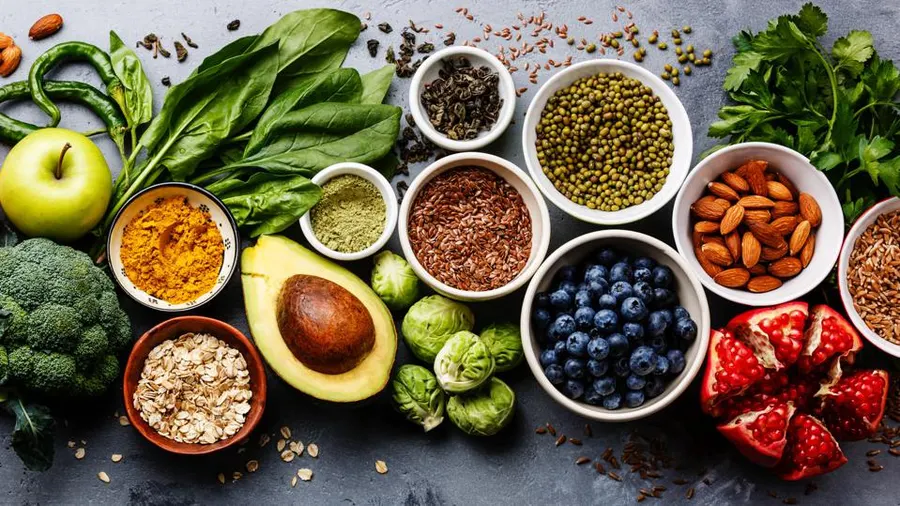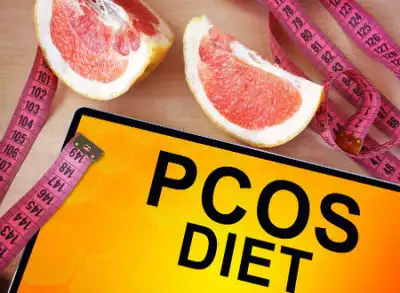Diet for PCOS/PCOD: Foods, Symptoms, Causes, and Meal Plan in Hyderabad
PCOS is a hormonal condition that is comparatively common in women who are fertile. High testosterone levels, infrequent ovulation, and a profusion of tiny cysts on the ovaries are all typical symptoms of PCOS in women.
Symptoms of PCOS include infertility, weight gain, acne, irregular or missing periods, and excessive hair growth. Women diagnosed with PCOS may also have an increased risk of endometrial cancer, high blood pressure, type 2 diabetes, and heart problems. Women with PCOS can effectively manage their symptoms with a healthy PCOS diet, regardless of whether or not they plan to become pregnant.
Women who plan to get in the future may combine the PCOS diet plan with various medications.
First off, what is PCOS?
The condition called polycystic ovarian syndrome (PCOS) is characterized by the overproduction of androgens by the ovaries. Androgens are male sex hormones that are normally present in women in small amounts. The condition known as polycystic ovarian syndrome is characterised by the development of numerous small cysts, or sacs filled with fluid, on the ovaries. However, cysts don't always develop in women alongside this illness, though they do occasionally in those who don't.
Ovulation occurs when an egg that has reached maturity releases itself from an ovary. This happens so that it can be fertilized by a male sperm. One unfertilized egg exits your body during your period.
Sometimes a woman's production of the hormones needed for ovulation is inadequate. When ovulation is absent, the ovaries may develop an abundance of tiny cysts. These cysts release hormones known as androgens. Women with PCOS often have elevated levels of androgen. This could make a woman's problems with her menstrual cycle worse. Furthermore, a lot of PCOS symptoms can be triggered by it.
PCOS/PCOD-positive women are more likely to experience several serious health problems, raising concerns such as: what is the best diet to treat PCOS? or is it possible for you? A few of these include uterine cancer, high blood pressure, heart, and blood vessel problems, and type 2 diabetes. Fertility problems are a common problem for women with PCOS/PCOD. One of the mainstays of PCOS/PCOD treatment is medication. It doesn't cure PCOS, but it can help with indicators and even a few medical conditions when combined with the best diet plan for PCOS losing weight.
PCOS symptoms
Symptoms of PCOS may include:
· Period missing, erratic cycles, or unusually light cycles
· Large ovaries or ovaries covered in many cysts
· Overgrowth of body hair, particularly on the chest, abdomen, and back (hirsutism)
· Gaining weight, particularly in the abdomen area
· Acne or oily skin
· Male pattern baldness or hair thinning
· Unable to conceive
· Skin tags are little protrusions of extra skin under the arms or around the neck.
· Thick or dark-colored patches on the rear of the neck, in the underarms, and behind the breasts
Some women may find it challenging to cope with the visible symptoms of PCOS, such as hair growth, weight gain, and acne. Cosmetic procedures like laser hair removal and electrolysis can boost your self-confidence. Which treatments work best for the symptoms you experience? Talk about this with your medical provider.
PCOS and Weight Loss: A Diet Plan for PCOS Individuals Hoping to Reduce Weight
Losing weight may be difficult if you have PCOS, but it is still attainable if you possess the right information and a solid support network. If you decide to go with the PCOS & PCOD diet plan that works best for you, here are some tips to help you lose weight.
Weight loss plan for PCOS diet:
· Increase your intake of protein and try a low-carb diet.
· Eat something after working out.
· Consuming large amounts of fibre contributes to a key component of the optimal diet plan for PCOS: it prolongs your feeling of fullness on lower calorie intake.
· Moreover, complex carbohydrates with lots of fibre won't spike your blood sugar and make you feel hungrier like simple, sugary carbs do.
· Additionally, if you're trying to cut back on your carbohydrate intake, healthy fats can support your feeling of fullness. A crucial component of the optimal diet for PCOS to lose weight is this.
· It's also possible that women with PCOS have less healthy gut flora than those without the condition, which would explain why they have difficulty gaining weight. Trying to get your system to contain more good bacteria can be beneficial.
How Is Diet Related to PCOS?
Eating a PCOS diet that meets their nutritional needs, aids in maintaining a healthy weight, and promotes optimal insulin levels may make women with PCOS feel better.
Research has shown that adhering to a PCOS diet and adopting specific eating habits can alleviate PCOS symptoms and potentially reduce the likelihood of developing associated health problems.
The key to the best meal for PCOS to lose weight is to minimise sugar, junk food, and trans fats and increase whole grains, seasonal produce, and protein from plants throughout. Depending on your requirements for overall health, you may need to adjust how much of the macronutrients (fat, proteins, and carbs) you consume or take additional supplements.
Although the best dietitian or medical professional may suggest you include or exclude specific foods from your personalised best-eating regimen for PCOS weight loss, this comprehensive list may be a good place to start.
The Fundamentals of a Diet for PCOS
· Eat a Comprehensive PCOS Diet: PCOS is a disease that affects a woman's ovaries as well as every other area of her physical structure and life. Thus, eating a healthy, balanced diet is essential for managing symptoms and preserving overall wellbeing while losing weight due to PCOS.
· Maintain a Regular Schedule and Meal Times: Skipping meals can also lead to overindulgence in food. These things increase your body's stress levels, which can worsen your glucose and cortisol issues as well as worsen PCOS symptoms. Eating every three to five hours and adhering to the best PCOS diet plan are generally recommended to maintain stable blood sugar and hormone levels throughout the day.
· Incorporate foods high in minerals and vitamins and rich in nutrients into your PCOS diet to lose weight. Carbs and protein both impact hormones and energy levels; therefore, you need to include both in your PCOS diet. When you eat protein, your body produces more insulin.
· Natural diets high in carbohydrates can make people more sensitive to insulin. Rather than trying to follow a low-carb diet, concentrate on getting adequate good-quality protein. The best plant-based protein sources are whole grains, legumes, and nuts.
Which foods ought to I include in my PCOS diet?
This is the healthy patient diet plan, which calls for the following foods:
· Natural, unprocessed foods are a crucial component of a PCOS diet.
· foods high in fibre
· fatty fish, including salmon, sardines, mackerel, and tuna
· dark greens, like spinach, kale, and other kinds.
· Deeply red fruits, including red grapes, cherries, blueberries, and blackberries
· Brussels sprouts and broccoli.
· Legumes, including lentils and dried beans,
· Healthy fats like those found in avocados, coconuts, and olive oil are essential components of the best diet for PCOS to lose weight.
· Nuts like pistachios, almonds, walnuts, and pine nuts can be included in a seven-day PCOS diet plan as snacks.
· Consuming dark chocolate on occasion.
· spices such as turmeric and cinnamon.
When I have PCOS, which foods must I limit or avoid?
It is generally advised that people with PCOS avoid foods that are generally widely considered to be unhealthy. These comprise:
· White bread and other mass-produced pastries are examples of refined carbohydrates that should be excluded from a PCOS diet.
· When following a PCOS patient's diet plan, fried foods, such as fast food, should be avoided.
· If you're on a 7-day PCOS diet, you have to stay away from sugar-filled beverages like soda and energy drinks).
· sausages, hot dogs, and luncheon meats are examples of processed meats.
· Margarine, Lard, and shortening are examples of solid fats.
· Excessive red meat, such as steaks and burgers, must be avoided on a seven-day PCOS diet.
Additional Lifestyle Adjustments to Take into Account if You Have PCOS
The management of PCOS is influenced by several factors. A few of them include your age, the intensity of the symptoms you have, and your overall health. The kind of care you receive may also depend on your future plans to become pregnant. Effective PCOS symptom management can be achieved by adhering to a prescribed PCOS treatment diet.
By altering their lifestyle, such as adopting a PCOS treatment diet, people with PCOS can control their condition. It has been demonstrated that the best diet plan for PCOS that includes exercise also reduces cholesterol and promotes weight loss, better digestion of insulin, more regular periods, lower levels of testosterone, and male-pattern hair growth.
How Can an Insulin Resistance Diet Help Manage PCOS?
Both hyperinsulinemia and insulin resistance appear to be prevalent in women with the condition polycystic ovarian syndrome, even though the precise cause of PCOS is unknown. This frequently results in worsening symptoms, trouble keeping a healthy weight, and an increased risk of getting other chronic illnesses.
Relationship Between Insulin and PCOS
According to research published in Fertility and Sterility, between 65 and 70 percent of PCOS-affected women are insulin-resistant. The study found that insulin resistance appears to have a distinct connection to PCOS and is not solely caused by obesity, despite being more common in obese women.
Therefore, managing insulin levels is crucial because PCOS patients are prone to an insulin spike cycle that increases their cravings for carbohydrates and sweets.






